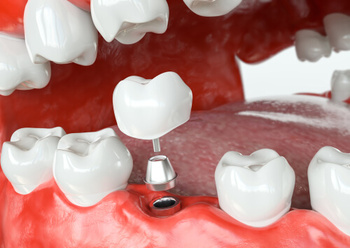If you’re pondering the switch to dental implants, you’re probably keen to understand the financial aspects. At first glance, the costs might seem steep, but it’s essential to remember that multiple elements contribute to the pricing. From the type of implant material to the dentist’s expertise and even your geographic location—each factor plays a unique role in determining the final bill. So, if you’ve ever wondered, “What am I actually paying for?” you’re in the right place. Continue reading to demystify the elements that make up the overall expense of dental implants, and arm yourself with the knowledge to make a well-considered choice for your dental future.
What Is a Dental Implant?
A dental implant is crafted from titanium and acts as a substitute for the natural tooth root. It firmly anchors within the jawbone, providing a solid base. Attached to this is the abutment linking the implant to the replacement tooth. This combination effectively fills the gap, replacing missing teeth with a harmonious appearance.
What Is the Typical Approach for Performing a Dental Implant Procedure?
1. Comprehensive Oral Examination
Every transformative dental journey starts with a comprehensive assessment. The dentist will examine the patient’s overall oral health, taking particular note of the area where the implant will be placed. The density and health of the jaw bone are critical, as they play a pivotal role in supporting the dental implant.

2. Preparing the Foundation: Bone Grafting
In cases where the jaw bone isn’t robust enough to hold the implant, bone grafting becomes essential. By augmenting the jaw with additional bone, either from the patient’s body or a synthetic source, the dental implant gets the strong foundation it needs.
3. Insertion of the Dental Implant
The heart of the dental implant treatment is the placement of the implant itself. Resembling a screw, this titanium structure is meticulously positioned into the jaw bone. This acts as a new root, which will eventually support the artificial tooth.
4. Healing and Integration Period
After the implant’s placement, a vital phase of healing commences. The dental implant undergoes osseointegration, where it integrates into the jaw bone, ensuring long-term stability. Maintaining good oral health and following the dentist’s instructions can aid in a smooth recovery.
5. Attaching the Abutment
With the implant stably integrated, it’s time to set the stage for the artificial tooth. The abutment, a small connector, is fixed onto the implant.
6. Tailoring the Tooth Replacement
Creating the perfect artificial tooth is both an art and a science. Using moulds of the patient’s mouth, dental professionals craft a tooth that’s not just functional but also harmonises with the natural teeth. Whether it’s a crown, bridge, or denture, attention to detail ensures a perfect fit.
7. Securing the Final Prosthesis
The final step in the dental implant surgery is anchoring the crafted artificial tooth onto the abutment. Adjustments are made to ensure a comfortable bite, alignment, and aesthetic appeal, culminating in a restoration that feels and looks natural.
Which Variables Contribute to the Fluctuation in Full-mouth Dental Implants Cost?
The Scope of Implantation
Beginning with the basics, the number and type of implants desired are primary cost determinants. A single dental implant addressing one missing tooth is naturally priced differently than a procedure that addresses multiple gaps.
Location and Its Influence
The geographical region where you opt for the treatment can play a significant role in the pricing structure. Urban centres with high operational expenses might reflect elevated prices for dental procedures. In contrast, areas with lower living costs might offer more economical solutions.
Professional’s Credentials
The expertise of the dental professional cannot be understated when discussing dental implant costs. Professionals with a legacy of successful implants, bolstered by their training and acclaim in the field, might have a higher fee structure, reflecting their stature and experience.
Material Considerations
The underpinnings of the implant—the very material it’s made of—can swing the price. Common materials like titanium have different grades and quality levels, each with its own pricing. Other choices, such as zirconia, can also introduce a distinct price range.
Patient-Specific Factors
Every individual presents a unique dental profile. Some might require preparatory procedures, such as bone grafting, to ensure the dental implant finds a robust base. These preparatory steps can add layers to the overall expenditure.
How Much Should One Expect to Pay for Teeth Implants in Australia?
The cost of dental implants in Australia can vary, but for a basic reference, a single dental implant typically starts from around $2,500. While this gives an approximate amount, it’s advised to contact local dental clinics for a detailed breakdown of dental implant treatment costs.
How Do Dental Implants Positively Impact Your Dental Health?
Reconstruction of Self-Image and Morale

Perhaps the most transformative and immediate benefit of dental implants is the restoration of one’s self-image. The absence or deterioration of teeth can often overshadow one’s self-assurance, affecting every smile, every laugh, and every conversation. By providing a solution that closely emulates natural teeth, dental implants breathe new life into an individual’s confidence, enabling them to engage in social settings with newfound enthusiasm.
Restoring Everyday Life Proficiencies
Our teeth play an integral role in various aspects of daily life. Their contribution goes beyond aesthetics, impacting speech clarity and the ability to process food efficiently. Dental implants reintroduce these proficiencies seamlessly. They ensure that individuals no longer have to struggle with unclear speech or dietary restrictions due to chewing difficulties.
Counteracting Jawbone Atrophy
Beneath the aesthetic concerns of a missing tooth lies a deeper, structural challenge. The lack of a tooth root can instigate jawbone recession, which, over time, can alter one’s facial profile, leading to a more aged appearance. Dental implants, by virtue of being anchored into the jawbone, counteract this atrophy by simulating the role of natural tooth roots and maintaining bone density.
Protection of Surrounding Teeth
A void left by a missing tooth can be a precursor to dental complications. Neighbouring teeth, over time, may veer into this space, leading to misalignment and potential bite issues. Dental implants serve as guardians, preventing this unwanted movement of surrounding teeth and ensuring the longevity and health of one’s overall dental alignment.
Ensuring Robust Oral Hygiene
Dental implants are focused on improving overall oral health. Since they stand alone, there’s no need to modify the nearby teeth, which can happen with dental bridges. This allows for maintaining strong dental care habits without any special adjustments.
What Measures Should Individuals Take to Maintain their Dental Implants Correctly?
Here are some indispensable steps that individuals should consider to ensure the longevity and optimal performance of their dental implants.
1. Emphasising Daily Oral Care
- Consistent Brushing: Using a toothbrush with soft bristles, it’s imperative to brush the dental implants and the adjoining gums twice daily. The goal is to eliminate plaque build-up, which could compromise the implant’s foundation.
- Incorporating Flossing: Flossing around the dental implant daily can prevent the accumulation of food particles and potential bacterial growth. Implant-specific flosses, available in the market, can offer enhanced results.
- Opting for Antimicrobial Mouth Rinses: Including a mouth rinse with antimicrobial properties in your daily regimen can further inhibit bacterial proliferation, ensuring the health of the implant and surrounding tissues.
2. Commitment to Periodic Dental Visits
By scheduling regular dental appointments, individuals can benefit from professional cleanings and evaluations. These sessions are instrumental in identifying and rectifying any budding issues related to the dental implant or the adjacent oral structures.
3. Elimination of Harmful Lifestyle Choices
- Abstaining from Smoking: Apart from its many other detrimental health effects, smoking can jeopardise the health and stability of dental implants. It’s recommended to abstain from this habit to ensure the longevity of the implant.
- Regulated Alcohol Consumption: While moderate alcohol consumption may not directly impact the implant, excessive intake can have adverse effects on oral tissues, potentially affecting the implant’s setting.
4. Protective Measures in Recreational Activities
Mouthguards can safeguard dental implants from potential trauma during physical activities, ensuring their preservation.
5. Monitoring for Bruxism
Those who grind their teeth, consciously or unconsciously, must be vigilant. Bruxism can exert added stress on the dental implant. If identified, measures like wearing a night guard can be instrumental in mitigating the impact.
What Are the Various Categories of Dental Implants?
For those exploring enduring and aesthetic resolutions to the loss of teeth, gaining insights into the variety of dental implant options is crucial. The evolution of dental methodologies has brought forth multiple implant variants, each serving the distinct needs and preferences of patients. Here’s a closer look at several kinds:
- Endosteal Implants: Frequently chosen, these are conventionally made of titanium and are crafted to mimic tiny screws. They are securely implanted into the jawbone, creating a reliable support structure for the replacement tooth.
- Subperiosteal Implants: Differing from endosteal options, these are positioned above the jawbone but underneath the gum line. They consist of a metallic frame that is positioned on the jawbone beneath the gum tissue and becomes secured to the jawbone as the healing process advances. It’s a suitable option for those with a lack of adequate healthy jawbone and those who are reluctant or unable to opt for a bone enhancement procedure.
- Zygomatic Implants: This variant is the most infrequent, chosen in scenarios where the jawbone is unsuitable for conventional implants. These are more extensive and are anchored within the cheekbone instead of the jawbone.
- Mini or Narrow Diameter Implants: Characterised by their smaller dimension, they are typically used for transient purposes or are suitable for individuals with limited bone mass unable to undergo bone grafting.
Determining the appropriate type of implant is made in collaboration with a dental professional, considering the individual’s oral health status, bone structure, and specific requisites.
What Should Be Included in the Post-tooth Implant Surgery Diet?
Embracing Anti-Inflammatory Foods
Post-implant surgery, selecting foods that possess anti-inflammatory properties is essential. Opt for items rich in omega-3s, such as walnuts and fatty fish, and antioxidant-rich fruits and vegetables, which can aid in minimising inflammation and enhancing the healing journey.
Integrating Nutrient-Dense Foods
Ensuring the intake of essential vitamins and minerals is pivotal during recovery. Soft fruits and well-cooked vegetables offer a wealth of nutrients without compromising the integrity of the implant site, supporting overall healing and well-being.
Incorporating Soft Dairy Items
Soft dairy products like milk and yoghurt are invaluable, offering calcium and protein, which are vital for bone strengthening and recovery. These foods are implant-friendly, allowing individuals to gain their benefits without discomfort or damage to the surgical site.
Prioritising Fibre Intake
Including soft, fibrous foods, such as well-cooked beans and porridge, is crucial for maintaining digestive balance during recovery. Opting for softer fibrous foods ensures no strain is placed on the implant site while maintaining optimal digestive health.
Staying Hydrated Mindfully
Proper hydration is vital, but care is needed to avoid straws, as the suction can harm the surgical site. Consuming liquids directly and opting for moderate temperatures help in avoiding discomfort and potential complications.
Lean Proteins are Crucial
Incorporating lean proteins like chicken and tofu can be beneficial. They are soft, easy to consume, and rich in essential proteins needed for the body’s repair mechanisms, ensuring the implant site remains undisturbed.
Avoiding Hard and Sticky Foods
The avoidance of hard and sticky foods is paramount in protecting the new implant. Consuming such foods can lead to damage or can interfere with the healing process. Therefore, candies, nuts, and similarly textured foods should be omitted from the diet during the initial recovery phase.
By mindfully selecting foods that are rich in essential nutrients, soft in texture, and avoiding potentially harmful ones, individuals can significantly enhance the healing process post-tooth implant surgery, ensuring the longevity and success of their dental implants.
Are Dental Implants Painful?

The thought of undergoing a dental procedure often brings with it apprehensions about pain, leading many to wonder: Are dental implants painful? It’s reassuring to know that most dental implant patients describe the sensation during the healing phase as discomfort rather than acute pain.
After the implant has been placed, some dental implant patients might experience minor swelling or tenderness in the surrounding area. These are typical reactions and usually dissipate within a few days. With advancements in dental technology and techniques, coupled with effective pain management strategies, the journey towards restoring one’s smile with dental implants is more comfortable than many anticipate. It’s always essential to maintain an open dialogue with one’s dentist to address any concerns or discomfort promptly.
Smile Renewal Awaits: Embrace Dental Implants at Our Brisbane Clinic
Transform your smile at our esteemed Brisbane clinic with dental implants, a groundbreaking solution to tooth loss. We don’t just offer a service; we offer a transformation, aiming not just to replace missing teeth but to restore your smile completely. Our team combines advanced technology with unparalleled skill to provide results that are not only functional but also aesthetically pleasing. We create a welcoming environment, ensuring your comfort and addressing your individual needs, making your journey to a rejuvenated smile a pleasant experience. Rediscover the joy and confidence that come with a full, radiant smile. Call us to book your appointment.
Note: Any surgical or invasive procedure carries risks. Before proceeding, you should seek a second opinion from an appropriately qualified health practitioner.
References
Dental implant surgery
https://www.mayoclinic.org/tests-procedures/dental-implant-surgery/about/pac-20384622
Osseointegration
